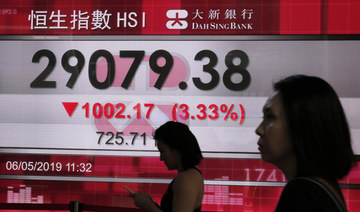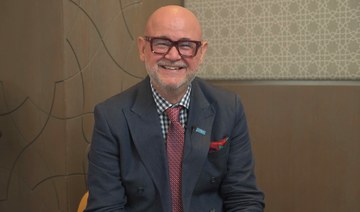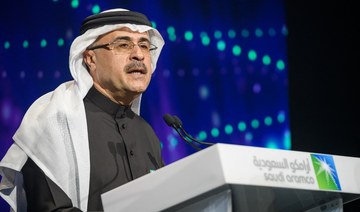WASHINGTON: The world’s top two economies on Thursday were due to resume fraught trade talks just as a truce between them verged on collapse, with hostilities poised to escalate after months of seemingly collegial negotiations.
Rather than sealing a deal this week — as officials in both countries had previously hinted was possible — Chinese trade envoy Liu He instead returns to the bargaining table just hours before Washington is due ramp up tariffs on hundreds of billions of dollars in his country’s most valuable exports.
President Donald Trump tweeted Wednesday that Liu still wanted to “make a deal” but late in the day China vowed to retaliate by taking “necessary countermeasures” should Trump persist in more than doubling the tariffs on Friday.
This was not how the week was initially meant to go.
The sudden rupture has roiled global stock markets this week, inflaming anxieties among exporters, markets and industries that had been lulled into optimism in recent months as both sides steadily announced progress in their efforts to end the trade war Trump started last year.
American officials this week accused their Chinese counterparts of retreating from major planks of an agreement they had been working toward since early in the year that aims to resolve Washington’s grievances of industrial theft, massive state intervention in markets and a yawning trade deficit.
Scott Kennedy, a China trade and economics expert at the Center for Strategic and International Studies, told AFP on Wednesday that the negotiating teams were unfamiliar with each other.
“The possibilities for miscalculation on both sides is pretty high,” he said, adding that the Chinese had apparently misjudged the American side’s intolerance for backtracking.
“It turns out the Chinese had pulled out an eraser and started taking back things that they had offered,” said Kennedy.
“They didn’t realize when they pulled their concessions off the table that the administration would have the reaction that it did.”
Since last year, the two sides have exchanged tariffs on more than $360 billion in two-way trade, gutting US agricultural exports to China and weighing on both countries’ manufacturing sectors.
US Trade Representative Robert Lighthizer released an official notice on Wednesday making the tariff increase a virtual fait accompli.
Duty rates on a vast array of Chinese-made electrical equipment, machinery, auto parts and furniture will jump to 25 percent at midnight Thursday (0400 GMT Friday), a painful leap up from the 10 percent first imposed last year.
Washington has demanded far-reaching and profound changes to the Chinese economy, such as submitting state enterprises to market principles, reducing massive subsidies and ending the alleged theft of US technology.
Analysts say China will be reluctant to make many of these changes, which could undermine the Communist Party’s political power.
And it is possible each side believes it is better positioned than the other to withstand the pain of the trade war, according to Kennedy.
Trump suggested Wednesday on Twitter that he would be just as content to strike a deal as to leave punitive import duties in place, believing they generate billions in government revenue.
While US companies complain of lost export markets, disrupted supply chains and higher costs, the trade war has so far not knocked the steam out of the American economy, which continues to see steady growth and hiring amid falling unemployment.
Anthony Nieves, who heads a survey of the services sector by the Institute for Supply Management, told reporters on Wednesday the tariffs were hitting China “a lot more than what we’re feeling over here in the states. There’s a lot of pressure on them.”
It remained uncertain on Wednesday precisely what offers Beijing may have withdrawn in the talks. Various media accounts indicated the Chinese side had balked at US demands that Beijing codify the seven-chapter agreement in Chinese law and publish the text of the agreement or indeed had sought to weaken most of its core elements.
Mary Lovely, an economist and expert on China trade at Syracuse University, told AFP on Wednesday the Chinese objected foremost to enacting a law to ratify the agreement, given that the text of any accord was likely to be “vague.”
In a concern for Trump, the tariffs due to rise Friday also have a greater potential to pinch US voters in their wallets as they could increase prices for popular consumer items, according to Lovely.
She also doubted the Chinese side had simply miscalculated the potential American reaction, adding that Liu, the Chinese trade envoy, likely still believed he could offer enough concessions to ensure a deal with the Americans.
“They’re bringing enough gifts to please the Grand Poobah in the White House,” she said. “Otherwise, I don’t think Liu would be coming.”
As trade truce collapses, US and China scramble to revive a deal
As trade truce collapses, US and China scramble to revive a deal
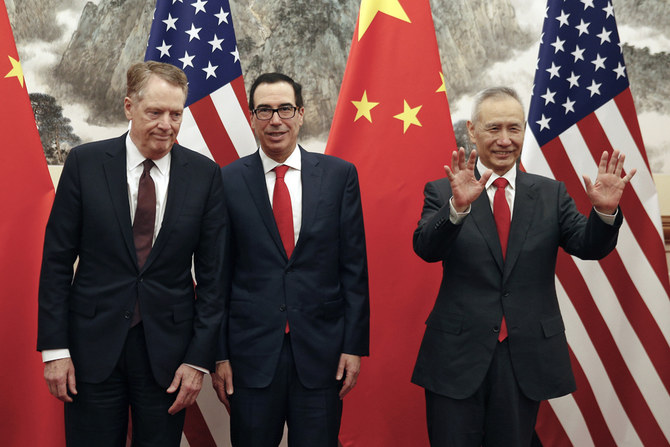
- US officials accused their Chinese counterparts of retreating from major planks of an agreement they had been working toward
- The sudden rupture has roiled global stock markets this week, inflaming anxieties among exporters, markets and industries
Brazilian energy official from Riyadh: ‘We are on our way to join OPEC+’
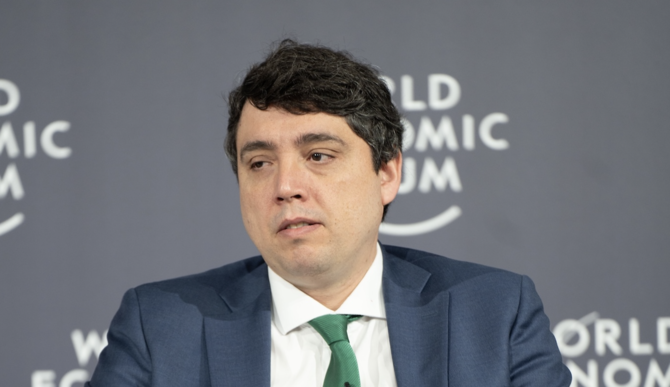
- Mendes stressed the importance of South-South cooperation, noting his country’s relationship with Egypt and Saudi Arabia
RIYADH: Pietro Mendes, Secretary of Oil, Gas and Biofuels at Brazil’s Ministry of Mines and Energy, confirmed on Monday that his country is on its way to joining the OPEC+ alliance.
Mendes’ announcement came during his participation in a session titled “Energy Demand: Transforming Costs into Profits” during the special meeting of the World Economic Forum held in Riyadh.
Brazil ranks ninth in the world in oil production at 3.25 million barrels per day.
“Brazil is joining OPEC+. So, the idea is to create cooperation because there (are) differences between regions and we don’t have just one single solution that comes from us or a union; we need to recognize all the solutions,” the Brazilian official said, adding while his country continues to produce oil and gas, it is simultaneously increasing reliance on renewable energies and adopting solutions to reduce emissions.
Mendes stressed the importance of South-South cooperation, noting his country’s relationship with Egypt and Saudi Arabia, where several initiatives are being developed for cooperation in biofuels and technology, including artificial intelligence, is being adopted to reduce carbon emissions.
‘Headquarters of your life’ coming to Saudi Arabia, says Wyndham Hotels regional president
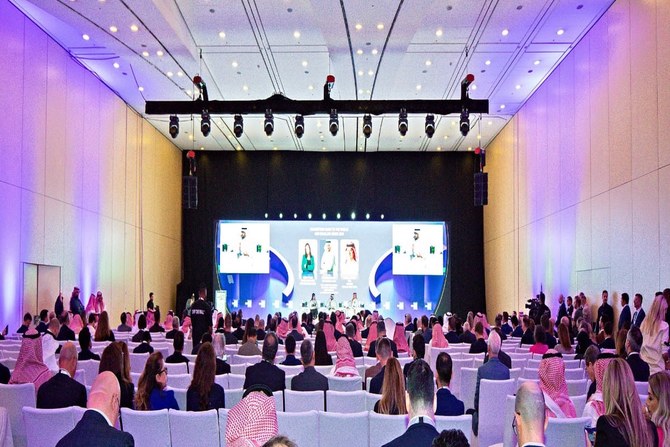
RIYADH: HQ, the new hospitality brand launched by Wyndham Hotels & Resorts and renowned hotelier Sam Nazarian, is set to arrive in Saudi Arabia by the end of 2025, Arab News has been told.
Dimitris Manikis, president of Europe, the Middle East, Eurasia and Africa, at the hospitality group, unveiled the company’s ambitious plans for the Kingdom – including the launch of HQ – at the Future Hospitality Summit in Riyadh.
Speaking to Arab News, Manikis shared insights into Wyndham’s steadfast commitment to Saudi Arabia’s flourishing hospitality landscape, saying: “We are very serious and very bullish about our presence in the Kingdom.”
He added: “We’re really excited to bring this new brand into Saudi Arabia as well, because it’s about smart luxury. It’s about F&B (food and beverage), entertainment, music, and it’s about smart hospitality as well.”
Manikis went on to say: “In the next 18 months, you’re going to have the first HQ brand in Saudi Arabia.”

Citing Nazarian’s track record of success with brands like Mondrian, Delano, and SLS, Manikis said: “Sam is notoriously famous for bringing up new concepts and ideas. So when I asked him: ‘What exactly is HQ and why would you call it brand HQ?’, he said: ‘I want the brand to be the headquarters of your life.’”
The President added: “I have no doubt whatsoever that HQ will be an amazing brand to grow in the GCC (Gulf Cooperation Council), and the Kingdom of Saudi Arabia in particular.”
Manikis reflected on Wyndham's impressive footprint across the Kingdom, which includes a robust pipeline of 20 upcoming projects. Notable among these ventures are the imminent openings of the Ramada hotels.
Additionally, the introduction of Wyndham Garden last year marked a significant milestone in the company’s strategic expansion efforts.
The optimism surrounding Saudi Arabia’s tourism prospects was palpable in Manikis’ remarks, citing the Kingdom’s remarkable achievement of surpassing the Vision 2030 tourism target of 100 million visitors in 2023.
“The bar has gone to 150 million tourists,” he remarked, highlighting Saudi Arabia’s accelerated progress towards becoming a global tourism destination.
However, he cautioned against neglecting the crucial role of infrastructure development in sustaining this growth momentum.
“Infrastructure, planes, airports, railways, roads, highways,” Manikis said, stressing the necessity of robust infrastructure to accommodate the influx of tourists.
Commending the government’s proactive measures, including the launch of a new airline and airport expansions, he expressed confidence in Saudi Arabia’s readiness to meet escalating demand.
“I do believe that the Kingdom of Saudi Arabia is actually going to fulfill the promise. And they're going to have an amazing Expo (2030). I don't think there's going to be any doubt about that,” he said.
As anticipation mounts for marquee events like the Expo and the FIFA World Cup in 2034, Manikis underscored the importance of post-event planning.
“It's not just about the event, it’s about what you do after,” he cautioned, advocating for sustainable strategies to leverage event infrastructure effectively beyond the festivities.
In addition to the HQ brand, Wyndham is poised to capitalize on the burgeoning extended stay segment.
“We are very bullish on extended stay,” Manikis stated, recognizing its potential to cater to diverse clientele, including families, business travelers, and digital nomads.
He added: “We added 11 beautiful luxury, extended stay products. And hopefully we’re going to extend the extended stay concept here in the Kingdom as well.”
IsDB, SFD, Arab Coordination Group join hands to raise $500m for education initiatives
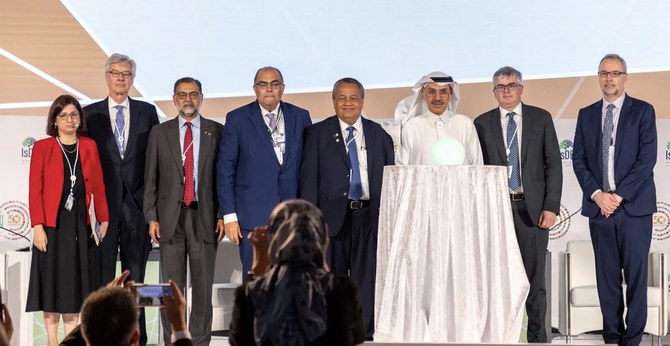
RIYADH: A global partnership involving the Islamic Development Bank will inject $500 million into educational initiatives across member countries of the Organization of the Islamic Cooperation.
During the annual meetings and golden jubilee celebrations of the IsDB, the Arab Coordination Group and the Saudi Fund for Development also joined The Global Partnership for Education, the Saudi Press Agency reported.
The Global Partnership for Education is a multi-stakeholder partnership and funding platform that aims to strengthen education systems in developing countries.
The amount will be raised by the Smart Finance for Education Initiative, an innovative financing tool.
Moreover, partners also pledged an additional $350 million to the initiative, including $150 million from the IsDB, $100 million from the Arab Bank for Economic Development in Africa, and $50 million from The Islamic Solidarity Fund for Development as well as $50 million from the Global Partnership for Education.
The initiative aims to enhance access to quality education in 37 OIC member countries, where 28 million children are without schooling.
Also at the event, the Islamic Corporation for the Insurance of Investment and Export Credit, a member of the IsDB concerned with providing Shariah-compliant insurance services, signed a retakaful agreement for a percentage of the shares allocated to Indonesia for the benefit of the country’s Eximbank.
A retakaful agreement is an Islamic reinsurance contract where takaful operators transfer a portion of their risk to a retakaful operator in compliance with Shariah principles.
The arrangement aims to provide strategic expertise and capabilities in the field of retakaful through a quota-sharing treaty specifically designed to support the launch of the financial institution’s new export credit takaful program product.
This comes as the business expected to be insured under this treaty is estimated at a value of $13 million during the year 2024.
During the IsDB annual meetings and jubilee celebrations, the bank’s president, Mohammed Sulaiman Al-Jasser, confirmed that the entity has designed a strategy for eco-conscious growth and low carbon reduction by supporting members to reach the zero-carbon goal.
Al-Jasser also pointed out that 40 of the bank’s projects are about renewable energy, green projects, and financing climate action.
He underlined the bank’s focus on green initiatives and sustainable development sukuk, indicating they are compatible with the Capital Markets Union standard.
The IsDB’s 2024 annual meetings are being held under the patronage of King Salman bin Abdulaziz in Riyadh from April 27 - 30.
The annual sessions coincide with IsDB’s golden jubilee, as the institution celebrates 50 years of promoting economic and social development in 57 member nations under the slogan “Taking pride in our past, shaping our future: authenticity, solidarity, and prosperity" reflecting the bank’s legacy and future goals.
Closing Bell: TASI closes in green; Saudi banks profits up
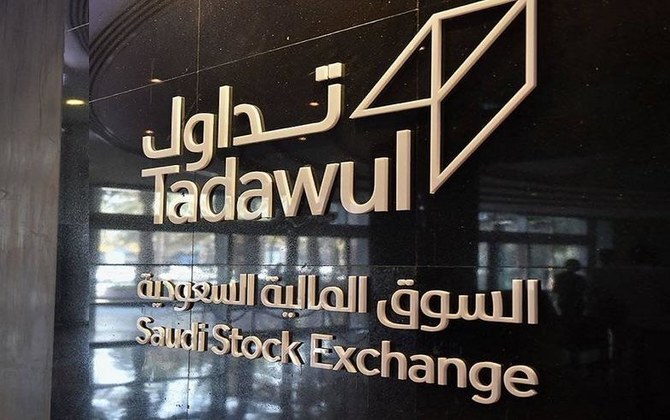
RIYADH: Saudi Arabia’s Tadawul All Share Index wrapped up Monday’s trading session at 12,369.46 points, witnessing an increase of 137.92 points, or 1.13 percent.
The parallel market, Nomu, ended the day at 26,227.72 points, shedding 3.11 points or 0.01 percent.
Conversely, the MSCI Tadawul Index grew by 24.35 points to close at 1,569.81, a 1.58 percent increase.
TASI reported a trading volume of SR8.2 billion ($2.19 billion), with 165 stocks making gains and 63 witnessing declines.
Nomu, on the other hand, saw a trading volume of SR52 million.
On the announcement front, Al Rajhi Bank reported an increase in profits to SR4.4 billion for the first quarter of 2024, reflecting a 6 percent rise from SR4.1 billion recorded during the corresponding period in 2023.
The bank primarily attributed this growth to a 10.2 percent increase in net income from financing and investment activities, driven by a rise in total income on financing and investment.
This was further supported by an increase in total returns on these investments, according to a bourse filing.
Its operational income also saw a healthy increase, rising by 6.6 percent due to gains in net financing and investment income alongside income from other operations.
However, these gains were partially offset by a decrease in income from banking service fees and foreign currency exchange activities.
On the expenditure side, total operating expenses, including provisions for credit losses, rose by 7.2 percent. This increase was largely due to higher depreciation costs and employee salaries and benefits.
Despite these rising costs, the bank managed to mitigate some financial pressures with a reduction in other general and administrative expenses. Notably, provisions for credit losses escalated significantly, from SR359 million in the previous year to SR421 million in 2024, reflecting a 17.3 percent increase.
Furthermore, Bank Albilad also saw an increase in profits as it released its first quarter results.
The bank reported a 15 percent increase in profits, reaching SR643.1 million up from SR559.9 million in the same quarter of the previous year, according to a bourse filing.
The increase in profits was primarily attributed to a robust performance in its investment and financing assets, which saw a 21 percent increase in income.
This significant growth in asset income helped offset the 54 percent rise in the return on deposits and financial liabilities, underlining the bank’s effective management of its asset portfolio against rising costs.
Additionally, Saudi National Bank also managed to secure an increase in profits in the first quarter. The bank reported a marginal rise in its profits to SR5.04 billion from SR5.02 billion during the same period last year.
This modest increase in profits was underpinned by a significant 21.9 percent rise in special commission income, driven largely by growth in the bank’s financing and investment portfolios, coupled with rising interest rates.
The bank also experienced a slight 0.4 percent increase in net income attributable to shareholders, buoyed by a 2.4 percent improvement in total operating income and gains from other non-operational financial activities.
However, petrochemical company Saudi Kayan reported a loss in its first quarter results. Despite the ongoing challenges, the company managed to reduce its losses to SR571.9 million from SR673.3 million in the same quarter the previous year.
Saudi Kayan attributed the narrowed losses primarily to an increase in revenues, spurred by higher sales volumes, which helped counterbalance the impact of lower average product selling prices.
In a Tadawul filing, the company noted that while the average selling prices had decreased, the overall financial performance improved compared to the previous year.
Saudi Aramco retains its status as Middle East’s most valuable brand
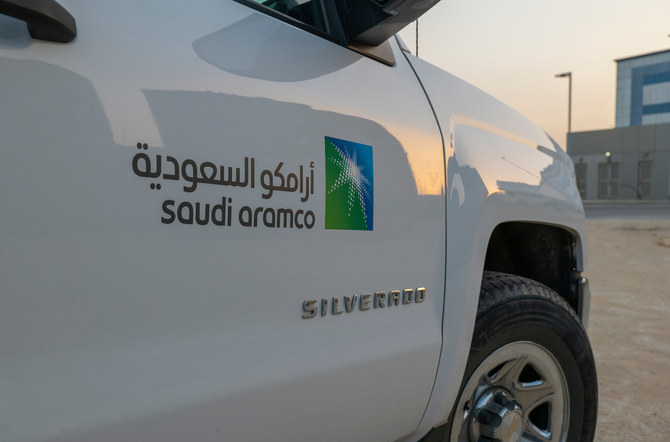
RIYADH: Energy giant Saudi Aramco has maintained its position as the Middle East’s most valuable brand, with a value of $41.5 billion, according to a report.
The latest analysis by Brand Finance revealed the firm continued to dominate the region despite an 8 percent drop in value, driven by a fall in crude oil prices and lower sales volumes.
The report noted that a 12 percent increase in brand value to $13.9 billion meant the Kingdom’s telecommunications firm stc was ranked as the second most valuable in the Middle East and the region’s most sought-after telecom company.
Andrew Campbell, managing director of Brand Finance in the Middle East, said that stc is steadily progressing as one of the leading telecommunications firms globally.
“While Aramco remains the dominant player in terms of brand value in Saudi Arabia, stc’s strategic acumen, characterized by ongoing diversification and digital transformation, have further solidified the brand’s status as Saudi Arabia’s strongest brand, while also positioning it among the world’s leading telecoms brands,” said Campbell.
The report noted that stc encompassed “an integrated system of subsidiaries specialized across sectors, alongside its traditional telecommunications services.”
It add that the company’s acquisition of an interest in Telefonica “marks another key milestone in stc’s growth journey.” said Brand Finance.
With a brand value of $6.4 billion, Al Rajhi Bank became the third most valuable firm in the Kingdom.
Saudi Basic Industries Corp. and Saudi National Bank were ranked fourth and fifth, respectively, with values totaling $4.9 billion and $4.5 billion, respectively.
Saudi Arabia’s King Faisal Specialist Hospital & Research Center, with a value of $1.5 billion, became the Middle East’s most valuable Healthcare label, the report added.
In the UAE, Abu Dhabi National Oil Co. was named the most valuable brand, with a value of $15.2 billion.
On the other hand, Qatar National Bank was ranked the top-rated brand among Qatari firms, with a value of $8.4 billion.




